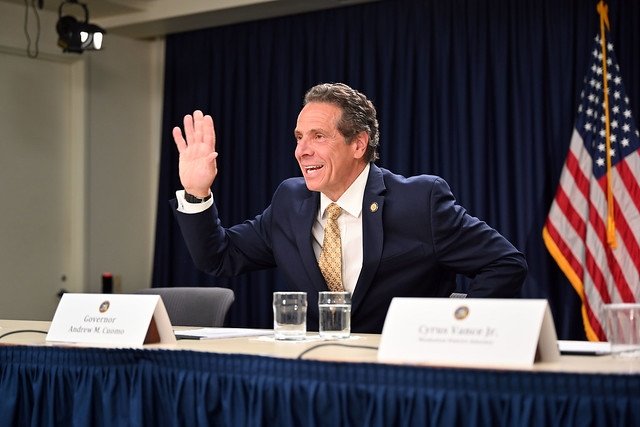Medical Cannabis Gets Caught In Cuomo Catch-22
June 27, 2019, 10:13 a.m.
According to one lobbyist, Cuomo "has two modes: 'You’re talking to me too early’ or ‘You’re talking to me too late.' It’s how he deals with legislation he doesn’t want to deal with."

Hillary Peckham didn’t have a great Thursday night last week.
“I wasn’t exactly surprised, but that doesn’t mean I wasn’t disappointed,” Peckham said on Monday, reflecting on the grand finale of the 2019 legislative session late last week.
Peckham had been following the closing hours of the session via Twitter, wondering if the Assembly, Senate and Governor Andrew Cuomo would salvage a dying bill with a potentially big impact on her family’s medical marijuana company, Etain.
But there was no salvation—no “message of necessity” from Cuomo that would have fast-tracked the required three-day waiting period before passing legislation—and the bill evaporated.
“It wasn't anything where I was throwing things and cursing,” said Peckham, the company’s Chief Operating Officer. “It was more like a big sigh—‘Ugh’—and then thinking, ‘I guess we’ll have to try again to get [lawmakers] to understand what this can do for people.’”
The bill, sponsored by Senator Diane Savino (D-Staten Island) and Assemblyman Richard Gottfried (D-Manhattan), was one of three backup plans, in case the exponentially more complicated and controversial package to legalize marijuana in New York failed—which is eventually what happened.
(On the final day of the session the two other backup-plan bills passed. One downgraded possession of up to two ounces of marijuana from a misdemeanor to a non-criminal violation. The other expanded hemp and CBD to packaged beverages and clarified regulations.)
Days before the legislative session ended, Cuomo said on WAMC that to avoid undermining ‘Plan A,’ there’s no point discussing Plan B “until the 20th hour.” Once it was all over, he said Plan B had come too late.
“You can’t just change medical marijuana policy at 10 o'clock at night,” he said. “I support the concept. But you can't do it that fast.”
Lobbyists who worked on the bill (but not the one Etain retained for $7,500 a month) and negotiated with administration officials disputed the timing.
“That’s nonsense,” said one. “He just wanted it to go away.”
“It’s totally disingenuous—and totally isn’t true,” said another.
They said Cuomo staffers at the highest levels had been actively negotiating with the legislature for weeks—and then again in the final days.
“He has two modes: ‘You’re talking to me too early’ or ‘You’re talking to me too late,’” one said, evoking a sort of 'Cuomo Catch-22' when it comes to negotiating bills. “It’s how he deals with legislation he doesn’t want to deal with.”
And yet reforming the medical cannabis system had seemed to many a relatively easy lift, compared to full legalization. Medical pot is already legal, but the industry has struggled—largely due to the state’s strictest-in-the-nation regulatory framework. In New York, companies have to be ‘seed to sale,’ and grow, process and retail marijuana independently. There’s a relatively short list of eligible medical conditions. And only physicians who take a four-hour course and register with the state can prescribe pot.
Combine a large infrastructure, limited tax deductions for capital investment or payroll, and no insurance coverage to defray patient costs, and the net result is sky-high retail prices and ten companies serving 102,978 certified patients, as of this week.
Also, it’s not like people lack for alternatives: there’s a burgeoning underground market, now that possession is largely decriminalized, and there’s a fully legal market next door in Massachusetts.
“It's kind of a chicken and egg thing: if we had a lot more patients purchasing you'd see prices come down, but to do that you have to make changes,” Peckham said. “Daily [new] patient enrollment is decreasing [state-wide], and I think that that trend will only continue, and unless there are immediate changes, it doesn’t seem like a very vital future.”
The Savino-Gottfried bill—which was basically lifted wholesale from the broader legalization package—proposed many changes. It would have doubled the number of retail dispensaries companies like Etain can operate. But more critically, it would have discarded the medical condition list and let anyone who can prescribe medications—doctors, physician assistants, nurse practitioners, dentists, podiatrists and more—use their medical judgment.
“There are a lot of ways we can broaden the program to serve more people,” Savino told WNYC/Gothamist.
By torpedoing medical marijuana—and failing to get behind the bigger legalization bill—Cuomo could revisit the whole issue next year in his preferred venue: the budget process.
“That’s when he has the power,” one marijuana lobbyist said.
In the meantime, Cuomo could also significantly reshape the medical marijuana program by having the Health Department—which he controls—modify regulations or issue new ones.
That’s what Hillary Peckham is hoping for.
“The Commissioner of Health can add any [medical] condition that he wants [to the cannabis list] without going through the legislature,” she said. “Even incremental steps would help, rather than waiting another year for another legislative session.”
Fred Mogul is the Albany and politics reporter for WNYC. You can follow him on Twitter @fredmogul.